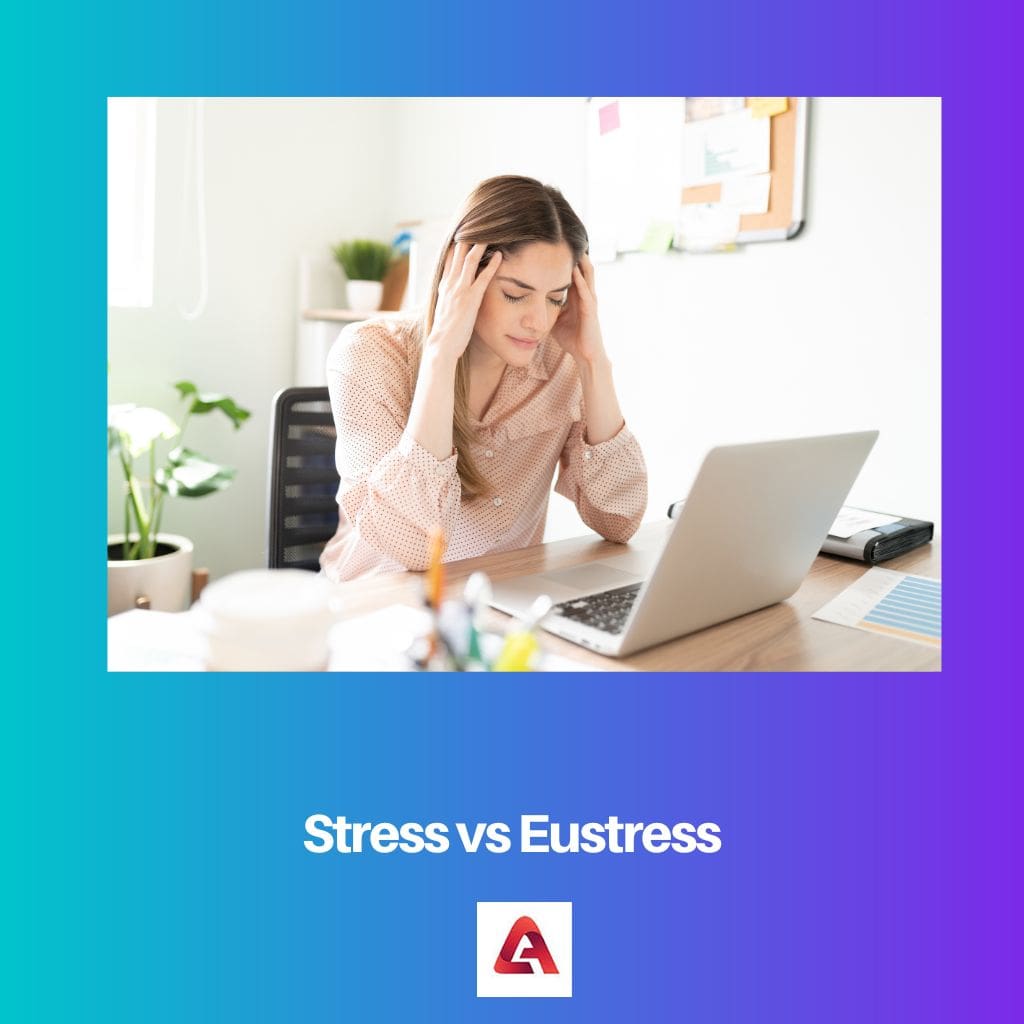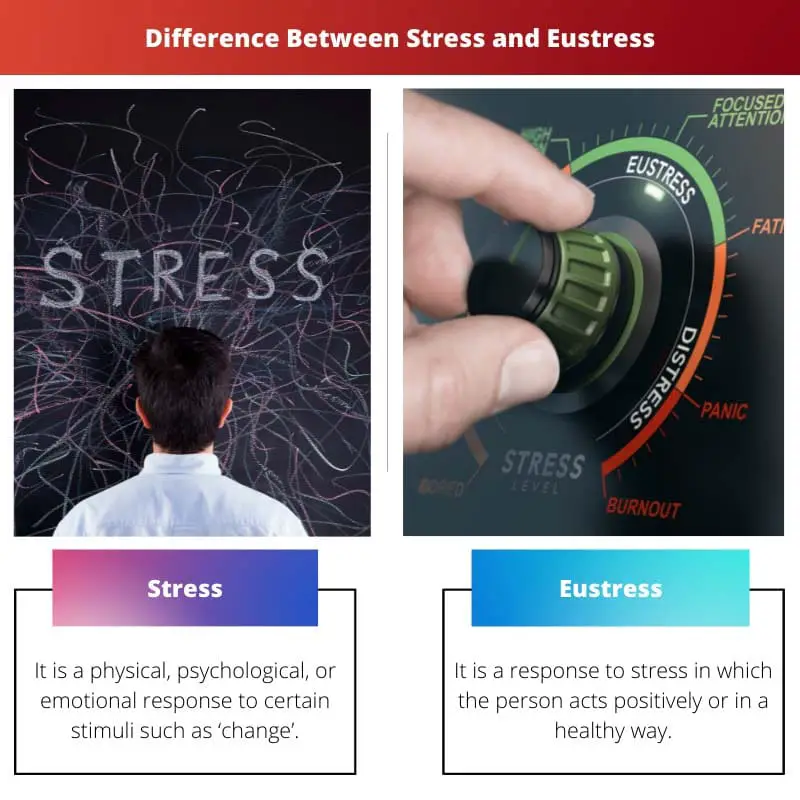Everyone is bound to come across tensions at some point in their lives, sometimes even daily. It is natural for the body to have a response to such stimuli. These responses may manifest physically, mentally, or even emotionally. It can be hard to categorize them as stress or eustress.
Key Takeaways
- Stress is a psychological or physiological response to external events or demands, while eustress is a positive form of stress that can enhance performance and well-being.
- Eustress occurs when individuals perceive a challenge as motivating and manageable, while distressing results from unmanageable or overwhelming situations.
- Eustress can lead to personal growth and improved performance, while chronic stress can contribute to various health problems.
Stress vs Eustress
Stress is a physiological and psychological response to a challenging or threatening situation. Eustress is a positive form of stress that can be beneficial to an individual. While stress is associated with negative events, eustress is associated with positive events or situations.

Stress is a common way for the body to respond to certain stimuli. It is associated with feelings of tension, psychological pain, and negativity. Many people experience it only for short durations. However, when prolonged, these feelings may lead to heart attacks, strokes, ulcers, mental illness and even depression.
On experiencing stress, there are numerous ways in which a person may react. Sometimes, the feeling triggers hope, motivation and a sense of meaning in a person. Such an experience is called eustress. It is a mechanism by which a person is able to cope with stress and react in a positive way.
Comparison Table
| Parameters of Comparison | Stress | Eustress |
|---|---|---|
| Meaning | It is a physical, psychological, or emotional response to certain stimuli such as ‘change’. | It is a response to stress in which the person acts positively or in a healthy way. |
| Origin | It was conceptualized in 1956. | It was conceptualized in 1974. |
| Connotation | It is not necessarily good or bad. | It is a kind of stress that is good. |
| Sources | It is triggered by experiencing some kind of change. | Some sources include going on a hike, fixing up a complex meal, riding a rollercoaster or even playing a challenging game. |
| Effects | It may lead to high blood pressure, fatigue, anxiety, apathy and even addiction in some cases. | It may lead to focus, motivation, sense of meaning, hope, alertness, and even higher levels of energy. |
What is Stress?
Stress is a natural response to any kind of stimulus that tends to put strain or pressure on a person. This could either be physical, emotional, or psychological. However, stress is not necessarily a good or bad thing in itself. Instead, people may have certain reactions to stress that may be positive or negative.
One of the most common reasons for stress is a change in external situations. This could include having a marriage, a divorce, moving into a new house, or even the death of a loved one. However, the source may even be internal at times. For example, if a person is suffering from a prolonged illness, he may feel stressed.
This feeling may either be acute or chronic. Acute stress is when the strain lasts for only a short period. It does not have major effects normally. However, the person may experience high blood pressure, anxiety, fatigue, or sadness. Chronic stress is when the strain lasts for a long period. This may cause problems such as strokes, heart attacks, mental illness and even depression.
Therapy is a good way to deal with stress, be it acute or chronic. Apart from this, a wide variety of techniques may help a person cope. This is done so that the feeling does not get in the way of day-to-day life, as it may deteriorate a person’s ability to function.

What is Eustress?
Eustress is a specific reaction to stress in which the person experiencing it is able to cope with the feeling. Essentially, it is when stress is dealt with in a positive or healthy way. In such a situation, stress normally acts as a source of motivation, focus, encouragement, and alertness. It may help induce a sense of meaning in the person’s life.
However, there are several effects that eustress may have on the body as well. Like stress, eustress may cause high blood pressure, anxiety, and fatigue. However, these effects are only short-lived. As the stress gets managed in a healthy way, there are no negative effects caused by eustress.
This form of response to stress may be triggered by many situations. For example, fixing up a complex meal, riding a roller coaster, being able to solve a difficult math equation, or even crossing a certain level in a video game. All of these can bring about a feeling of positivity as a successor to strain and pressure.
The term ‘eustress’ was coined by Hans Selye in 1974, which was several years after the conceptualization of stress. Hans was an endocrinologist who used the Greek prefix ‘eu-’, meaning good. Therefore, according to his definition, eustress was essentially ‘good stress’.
Main Differences Between Stress and Eustress
- Stress is a physical, psychological, or emotional response to certain stimuli such as ‘change’, whereas eustress is a response to stress in which the person acts positively or in a healthy way.
- Stress was conceptualized in 1956, whereas eustress was conceptualized in 1974.
- Stress is not necessarily good or bad, whereas eustress is a kind of stress that is good.
- Stress is triggered by experiencing change, whereas eustress may be caused by sources such as include going on a hike, fixing up a complex meal, riding a rollercoaster, or even playing a challenging game.
- Stress may lead to high blood pressure, fatigue, anxiety, apathy and even addiction in some cases, whereas eustress may lead to focus, motivation, a sense of meaning, hope, alertness, and even higher levels of energy.


Great article, very informative about the differences between stress and eustress.
I found the comparison table very helpful in understanding the distinctions between stress and eustress.
I agree, this is a very insightful piece on stress and eustress.